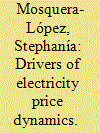| Srl | Item |
| 1 |
ID:
163533


|
|
|
|
|
| Summary/Abstract |
Against the backdrop of numerous evidence that variable renewable generation decreases electricity prices and increases price volatility, this paper assesses the drivers of electricity prices in spot and futures markets, focusing on the German electricity markets. We take into account nonlinearities in electricity prices by means of structural breaks and threshold regressions. We find that short-run and medium/long-run price drivers differ and, more importantly, that they vary over time. In the case of the spot market, the determinants of prices are renewable infeed and electricity demand, while in the futures market the main drivers are natural gas, coal and carbon prices. Our results give relevant insights for market participants who seek to optimize procurement/selling strategies in the spot market, and use the futures market to hedge against spot price volatility, which has increased due to a higher renewable generation.
|
|
|
|
|
|
|
|
|
|
|
|
|
|
|
|
| 2 |
ID:
193720


|
|
|
|
|
| Summary/Abstract |
Does the merit-order effect vary between renewable technologies? The theory behind the effect predicts the same right shift in the supply curve from solar as from wind electricity, which means no. However, many empirical studies suggest yes. A clear answer to this question is important for policymakers to design suitable policy instruments to promote renewable electricity. This study reconciles the theory of the merit-order effect with the empirical results using a quasi-experimental approach. Coarsened exact matching is applied in order to estimate the merit-order effect for solar and wind electricity generation and the results indicate that when using this thorough identification strategy, there is no empirical evidence for a difference in the merit-order effect between solar and wind electricity generation. To this end, different merit-order effects of solar and wind electricity will originate from interactions with other variable in the electricity system. Therefore, empirical studies need to carefully disentangle the effects of these variables in order to provide useful and reliable insights for policymakers and financial stakeholders.
|
|
|
|
|
|
|
|
|
|
|
|
|
|
|
|
| 3 |
ID:
176851


|
|
|
|
|
| Summary/Abstract |
The share of variable renewable energy sources in power supply has increased significantly in many countries; however, this increase has also created problems in electricity markets. While the average day-ahead market price has declined in several markets (the merit-order effect), the remuneration mechanisms in some countries have to be revised due to the surge in financial costs. Yet, further research is needed to understand the implications of the merit-order effect for remuneration mechanisms thoroughly. Accordingly, this study aims to contribute to the literature through employing a quantile regression model to analyze the merit-order effect and discuss its implications for the remuneration mechanism in Turkish electricity market. Model results show significant negative merit-order effect for both wind and run-of-river hydro technologies; however, this effect varies with respect to demand, price level and technology. Moreover, the contribution of these technologies to the total welfare in the Turkish electricity market does not favor fixed-price payments. In conclusion, it is recommended that the remuneration mechanism is revised to include the temporal value of variable renewable energy sources and electricity market design should reflect the locational value of variable renewable energy sources in Turkey.
|
|
|
|
|
|
|
|
|
|
|
|
|
|
|
|